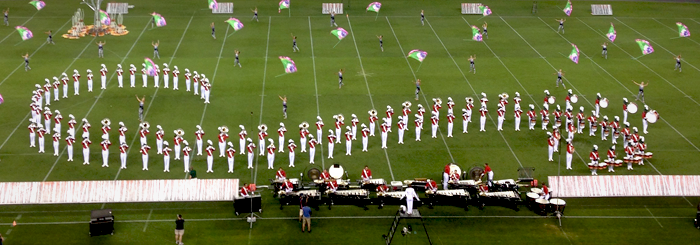
As a music educator, the influence you have on your students will be felt for decades to come. With the drum corps season in the books, I am reminded of my time marching with Star of Indiana many years ago. From today’s perspective I can now more fully appreciate how the staff taught many life (and professional) skills to those of us on the field.
Today as MakeMusic’s vice president of engineering, I am an enthusiastic practitioner of Agile Software Development, a commonly accepted approach to developing software. Below are some aspects of the Agile methodology, each followed by my observations of how drum corps (at times unknowingly) prepared me for these vital aspects of my work and life.
Teamwork
It is a common observation that the esprit de corps matters to a performance group. Spending months with a small group of people working on a single goal distills the camaraderie to the purest level. My interactions with my corps mates, communication patterns, feedback sessions, and celebrations produced a great environment for learning to work with others. The trust and collaboration of a team is cornerstone to success.
Product Delivery to the Customer
As members of a drum corps, we each had our part to perform, but the unity of presenting a quality show to the audience always outweighed our individual contribution. Everyone made sacrifices to strengthen the whole. We learned to collaborate, listen, support, encourage, and celebrate together. General effect matters!
The Agile Manifesto prioritizes the delivery of working software over comprehensive documentation. When we provide a strong solution, the entire team succeeds.
Iterate, Iterate, Iterate
Two of my favorite lessons from drum corps are:
- Never make the same mistake twice.
- Every time you rehearse focus on two things to improve.
When you follow these two rules, amazing things happen. The same is true on an agile team. You fix broken things, you work to address root causes, and you focus on a handful of issues to improve each iteration. 1% compounded for a year is 3,700%. Find your 1% and work to improve every day.
Adapt and Evolve
As Dwight Eisenhower said, “Plans are useless, but planning is indispensable.”
The show we performed in May was nothing like the final performance in August. We responded to change and adapted every day, up to the day of Finals. We had plans, sets, charts, and schedules, but we adapted and evolved with feedback. This is one of the key aspects of Agile manifesto: Responding to change over following a plan.
Immediate Feedback
A key part of adapting is responding to feedback. Each night the judges gave us feedback on our work earlier in the day. The next day we’d listen to the tapes, evaluate our own performance, and implement improvements. What is the chase and how do I cut to it? Defining acceptance criteria, authoring unit tests, peer reviewing code, receiving feedback from the product owner, executing manual tests, and engaging in a beta program all give feedback at every step of the cycle. Finally, at the end of every iteration, we have a retrospective and adjust our team as needed.
Sustainable Pace
We logged thousands of miles, rehearsal hours on end, and performed nightly. It was important to stretch, warm up, warm down, and listen to our bodies because we were learning work / life balance matters. The team has to maintain a velocity that adds value at an appropriate pace and doesn’t cause burn out or low quality.
Quality Matters
Over the course of nine months we rehearsed over 100 hours per every minute of the show; I suspect corps today have an even more impressive ratio. The level of detail visually and aurally is impressive when you take that much time to get it right.
If you’ve had the pleasure of watching a great drum corps you know that it is the quality of the ensemble that is overwhelming. I also find the same to be true of software development. A great application delights you with an attention to detail and a natural flow to solve the problem, meet your needs, and make the world a better place.
What I learned marching in a drum corps continues to serve me well. Ultimately, as a corps we had a goal, made a plan, worked together, listened to feedback, adapted, and always focused on delivering a quality product. The same is true of a software development team.
It is well documented that musicians make great software developers. I contend that the more than 5,000 members that participated in drum corps this past summer could become great Agile software development professionals. MakeMusic is often looking for talent, from college students interested in internships to developer and other roles. Interested in joining us? Check out our careers page and sign up for our career alerts.
Congratulations to the Bluecoats on your victory and all the corps that participated in the world championships.
 Michael Johnson lives in Colorado with his husband, Owen, and their son, Elliot. When he isn’t developing software, he enjoys playing the trumpet and bicycling around the Rocky Mountains.
Michael Johnson lives in Colorado with his husband, Owen, and their son, Elliot. When he isn’t developing software, he enjoys playing the trumpet and bicycling around the Rocky Mountains.
Michael has enjoyed working with members of Suncoast Sound, Cavaliers, Blue Devils, Madison Scouts, Blue Stars, Govenaires, the Kilts, and Blue Knights while at MakeMusic.
See Michael perform with the Star of Indiana in 1986. At 0:16 he’s the second from the right!
Santa Clara Vanguard photo (above) courtesy of CJ Garcia.